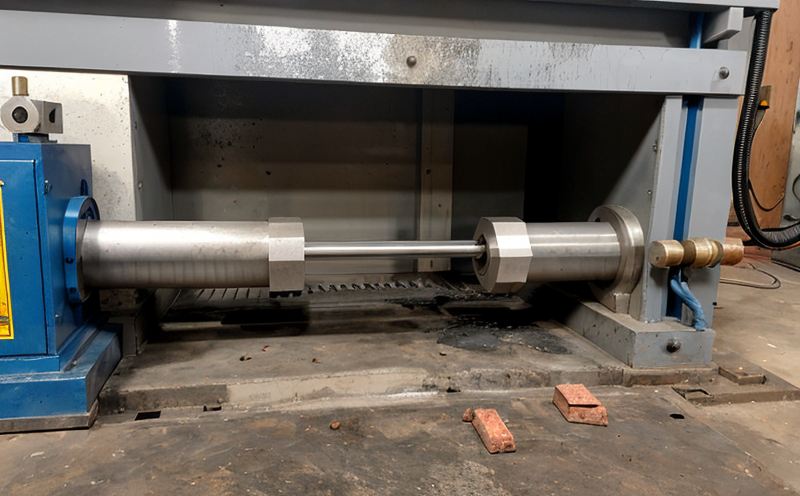ASTM D790 Flexural Testing of Plastics Precision and Accuracy Evaluation Test
The ASTM D790 flexural testing method is a critical procedure used to evaluate the flexural properties of plastics, providing essential data on how materials behave under bending stress. This test is particularly important in industries where structural integrity and durability are paramount, such as automotive, aerospace, construction, and consumer goods manufacturing.
The ASTM D790 test measures the maximum load a specimen can withstand before breaking or undergoing permanent deformation, which helps engineers design products that meet specific performance requirements. This method is crucial for ensuring that materials used in critical applications are capable of withstanding environmental stresses without compromising safety and functionality.
The testing process involves preparing specimens according to ASTM D790 standards. The specimen dimensions must be precise; deviations from the specified sizes can lead to inaccurate results, which could mislead design decisions or compliance assessments. Once prepared, the specimens are placed in a flexural machine designed specifically for this test.
The machine applies a load gradually until failure occurs, recording the maximum load and deflection at that point. This information is then used to calculate the flexural modulus (stiffness) and flexural strength (ultimate stress). These values are critical in understanding how materials will perform under real-world conditions.
The precision of ASTM D790 testing is paramount, especially when ensuring compliance with international standards such as ISO 178 and EN 14253. Variations in test methods can lead to significant differences in results, which could affect the reliability of product design decisions. Ensuring that tests are conducted under controlled conditions by skilled personnel using calibrated equipment minimizes these variations.
One common challenge in ASTM D790 testing is maintaining consistent environmental conditions during specimen preparation and testing. Temperature fluctuations or humidity can influence material properties, leading to inaccurate results. Therefore, laboratories must adhere strictly to specified environmental controls to ensure accurate measurements.
The accuracy of ASTM D790 testing also depends on the precision of the flexural machine used. High-quality machines equipped with digital load cells and displacement sensors provide more reliable data than older analog models. Additionally, regular calibration ensures that instruments remain accurate over time, further enhancing test reliability.
In conclusion, ASTM D790 flexural testing is a vital tool for assessing the structural integrity of plastics in various industries. By adhering to strict procedures and using state-of-the-art equipment, laboratories can produce precise and accurate results that contribute significantly to product development and quality assurance processes.
Why It Matters
The ASTM D790 flexural testing method is crucial for several reasons. Firstly, it provides valuable insights into how plastics will behave under bending stress, which is essential for predicting their performance in real-world applications. This knowledge helps engineers design products that are both safe and functional.
Secondly, compliance with international standards such as ASTM D790 ensures that materials meet specific quality requirements set by regulatory bodies worldwide. Non-compliance can lead to product recalls or legal issues, which could be costly for manufacturers.
Additionally, accurate flexural testing data enables companies to make informed decisions about material selection and design optimization, ultimately leading to improved product performance and reduced development costs. By investing in high-quality ASTM D790 testing services, businesses can gain a competitive edge by ensuring their products meet or exceed industry benchmarks.
Lastly, consistent ASTM D790 testing across different sites helps maintain uniform quality standards, which is particularly important for multinational corporations operating in various regions. This consistency ensures that all products meet the same rigorous performance criteria regardless of where they are manufactured.
Applied Standards
The ASTM D790 flexural testing method is widely recognized and applied across numerous industries. Key standards associated with this test include:
- ASTM D790-18 Standard Test Method for Flexure of Rigid Plastics: This standard provides detailed procedures for conducting flexural tests on rigid plastics, ensuring consistency and accuracy across various laboratories.
- ISO 178:2016 Plastic Materials - Determination of Flexural Properties by Four-Point Bending: This international standard offers guidance on measuring the flexural properties of plastic materials using a four-point bending setup, which is often used alongside ASTM D790.
- EN 14253:2006 Plastics - Determination of Flexural Properties by Four-Point Bending: This European standard specifies the methodology for determining flexural properties through four-point bending, aligning closely with both ASTM D790 and ISO 178.
These standards ensure that testing procedures are standardized, facilitating comparison of results between different laboratories and regions. Compliance with these standards is essential for maintaining credibility and ensuring that products meet the necessary performance criteria.
Industry Applications
The ASTM D790 flexural testing method finds extensive application in several industries due to its ability to assess plastic materials' mechanical properties accurately. Here are some key applications:
- Aerospace and Defense: Materials used in aircraft structures must withstand significant stress without failure, making ASTM D790 testing crucial for ensuring safety and reliability.
- Automotive Manufacturing: From car components to body panels, plastics play a vital role. Flexural tests ensure that these materials can endure the rigors of everyday use without compromising performance.
- Consumer Goods: Products like household appliances and sports equipment require robust materials capable of withstanding various environmental conditions. ASTM D790 testing helps manufacturers select appropriate plastics for their products.
- Biomedical Engineering: Medical devices made from plastic must be durable yet lightweight, making flexural tests essential for ensuring they meet stringent safety standards.
By conducting thorough ASTM D790 testing, industries can ensure that their materials are suitable for the intended applications, thereby enhancing product quality and safety. This commitment to precision and accuracy in material testing is critical for maintaining industry trust and compliance with global regulations.





